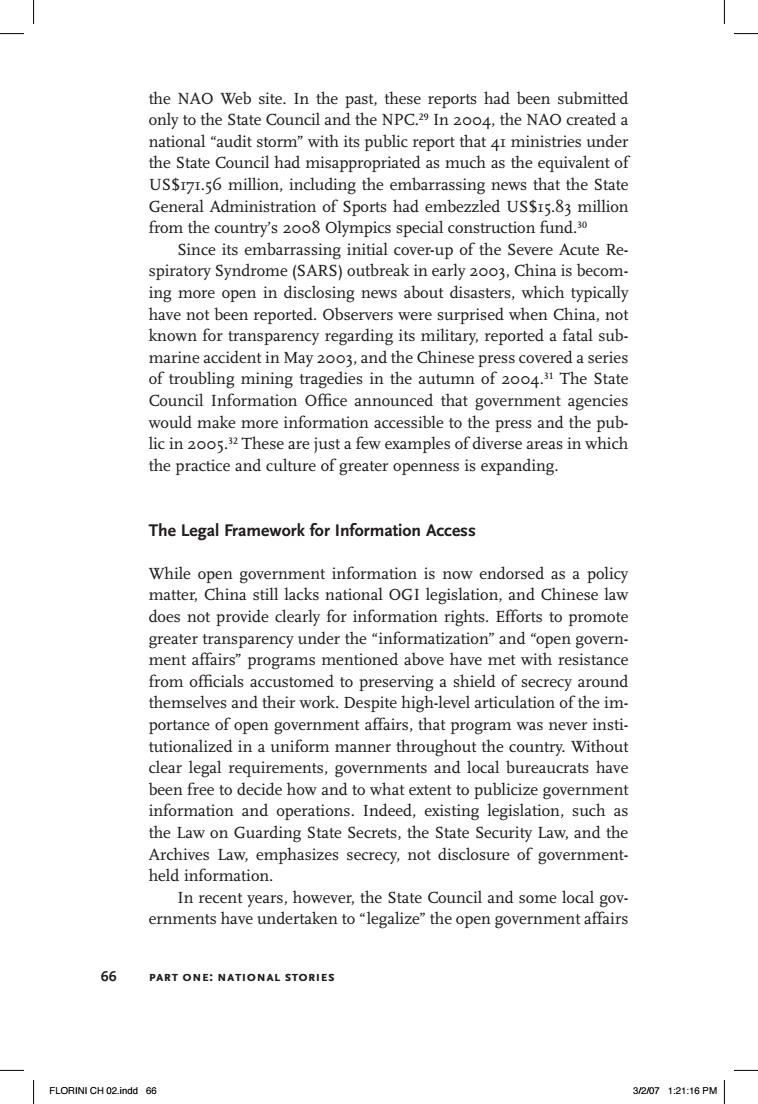正在加载图片...

the NAO Web site.In the past,these reports had been submitted only to the State Council and the NPC.2 In 2004,the NAO created a national "audit storm"with its public report that 4I ministries under the State Council had misappropriated as much as the equivalent of USSI71.56 million,including the embarrassing news that the State General Administration of Sports had embezzled USSI5.83 million from the country's 2008 Olympics special construction fund.30 Since its embarrassing initial cover-up of the Severe Acute Re- spiratory Syndrome(SARS)outbreak in early 2003,China is becom- ing more open in disclosing news about disasters,which typically have not been reported.Observers were surprised when China,not known for transparency regarding its military,reported a fatal sub- marine accident in May 2003,and the Chinese press covered a series of troubling mining tragedies in the autumn of 2004.31 The State Council Information Office announced that government agencies would make more information accessible to the press and the pub- lic in 2005.32 These are just a few examples of diverse areas in which the practice and culture of greater openness is expanding. The Legal Framework for Information Access While open government information is now endorsed as a policy matter,China still lacks national OGI legislation,and Chinese law does not provide clearly for information rights.Efforts to promote greater transparency under the "informatization"and "open govern- ment affairs"programs mentioned above have met with resistance from officials accustomed to preserving a shield of secrecy around themselves and their work.Despite high-level articulation of the im- portance of open government affairs,that program was never insti- tutionalized in a uniform manner throughout the country.Without clear legal requirements,governments and local bureaucrats have been free to decide how and to what extent to publicize government information and operations.Indeed,existing legislation,such as the Law on Guarding State Secrets,the State Security Law,and the Archives Law,emphasizes secrecy,not disclosure of government- held information. In recent years,however,the State Council and some local gov- ernments have undertaken to "legalize"the open government affairs 66 PART ONE:NATIONAL STORIES FLORINI CH02indd 66 3/2071:21:16PM66 part one: national stories the NAO Web site. In the past, these reports had been submitted only to the State Council and the NPC.29 In 2004, the NAO created a national “audit storm” with its public report that 41 ministries under the State Council had misappropriated as much as the equivalent of US$171.56 million, including the embarrassing news that the State General Administration of Sports had embezzled US$15.83 million from the country’s 2008 Olympics special construction fund.30 Since its embarrassing initial cover-up of the Severe Acute Respiratory Syndrome (SARS) outbreak in early 2003, China is becoming more open in disclosing news about disasters, which typically have not been reported. Observers were surprised when China, not known for transparency regarding its military, reported a fatal submarine accident in May 2003, and the Chinese press covered a series of troubling mining tragedies in the autumn of 2004.31 The State Council Information Office announced that government agencies would make more information accessible to the press and the public in 2005.32 These are just a few examples of diverse areas in which the practice and culture of greater openness is expanding. The Legal Framework for Information Access While open government information is now endorsed as a policy matter, China still lacks national OGI legislation, and Chinese law does not provide clearly for information rights. Efforts to promote greater transparency under the “informatization” and “open government affairs” programs mentioned above have met with resistance from officials accustomed to preserving a shield of secrecy around themselves and their work. Despite high-level articulation of the importance of open government affairs, that program was never institutionalized in a uniform manner throughout the country. Without clear legal requirements, governments and local bureaucrats have been free to decide how and to what extent to publicize government information and operations. Indeed, existing legislation, such as the Law on Guarding State Secrets, the State Security Law, and the Archives Law, emphasizes secrecy, not disclosure of governmentheld information. In recent years, however, the State Council and some local governments have undertaken to “legalize” the open government affairs FLORINI CH 02.indd 66 3/2/07 1:21:16 PM